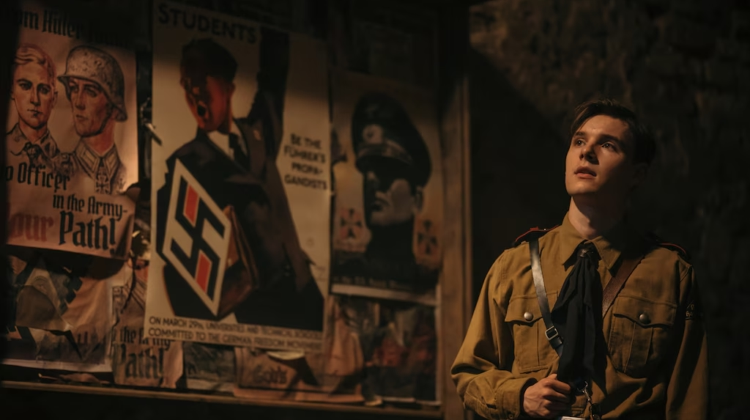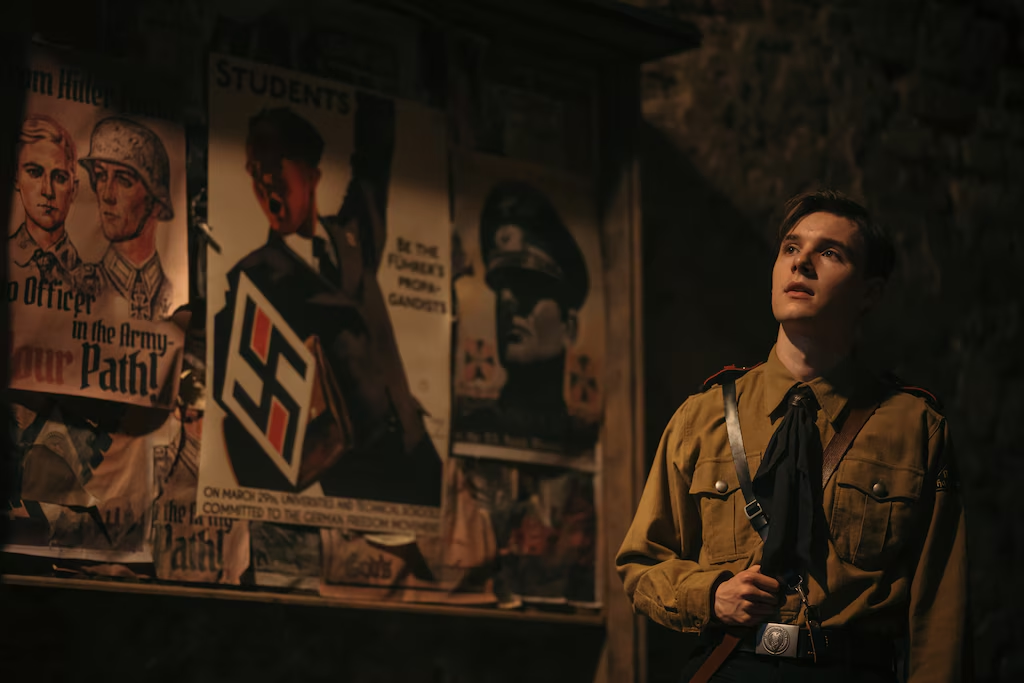
[Order Michael Finch’s new book, A Time to Stand: HERE. Prof. Jason Hill calls it “an aesthetic and political tour de force.”]
I knew what Truth & Treason was about before I watched it. I thought I’d seen enough movies about Nazi Germany to be able to get through it in one piece. But no: by the end of this thing I was in tears.
Truth & Treason is based on the true story of Helmuth Hübener, who, as the closing title cards tell us, was “the youngest resistance fighter in Nazi Germany to be sentenced to death for taking a stand against Hitler.” He was 16 at the time of his arrest, and 17 when he was executed.
As Truth & Treason begins, we meet Helmuth (Ewan Horrocks) along with his best friends, Karl-Heinz Schnibbe (Ferdinand McKay), Rudi Wobbe (Daf Thomas), and Salomon Schwarz (Nye Occomore). They’re a close-knit foursome who are admirably loyal to one another: when a fellow member of the Hitler Youth calls Karl-Heinz a pansy, Helmuth – who is, by nature, plainly not the violent sort – punches the guy.
Of the four, Helmuth is the smart one. When he’s hired to be the youngest intern ever hired at Hamburg’s City Hall, his friends congratulate him heartily. Helmuth also has a way with words, and when he forgets to compose beforehand the statement of Nazi faith that he’s required to deliver aloud before he can assume his duties at City Hall, he improvises an oration about how Germany is at “the dawn of a National Socialist millennium” in which “millionaires” and “the bourgeoisie” will become history as a result of “our German perseverance, our blood, our very nature.” His new bosses are more than impressed by his eloquence.
The year is 1941, and for Helmut, as for the Third Reich, everything seems to be going swimmingly.
Then it happens. Salomon, who is Jewish, is caught on the street after curfew and beaten up by a couple of Nazi officers. Helmuth, disturbed by this development, begins to listen to the BBC late at night on a short-wave radio that his brother purchased illegally. What he hears is the truth about the evil regime he’s living under.
In his own life, that evil begins to manifest itself soon enough. On the door of his church, the bishop posts a sign: “Jews forbidden to enter.” Helmut, a devout believer, is devastated. How can such a thing be reconciled with the commandment to love thy neighbor as thyself? After the Nazis break into Salomon’s home and take him away (he ended up dying in Auschwitz), Helmuth shares his concerns with his bishop. “Be true to your convictions,” the bishop urges him.
He thinks he’s encouraging Helmuth to be a good Nazi. In fact, his words accomplish the exact opposite. Borrowing the church typewriter, Helmuth writes the first of several leaflets denouncing Hitler – he’s turned his subjects, charges Helmuth, into “spineless puppets” – and calling on Germans to overthrow him. Copying these manifestos on the church’s mimeograph machine, he races around Hamburg at night, placing them in people’s mailboxes and posting them on the walls of buildings.
Soon both Karl-Heinz and Rudi have joined Helmuth’s small-scale rebellion. It’s risky, to say the least. Observed from a distance posting one of his leaflets, Helmuth has to run for his life. An SS officer, Erwin Mussener (Rupert Evans), notices the distinctive peculiarities of the typewriter that’s being used to write the leaflets and starts trying to track it down. At City Hall, Helmuth drops some papers on the floor, including a couple of his leaflets, and a female coworker, Elli Kluge (Sylvie Varcoe), quickly grabs them up before anyone else can notice them. “Better watch where you’re going,” she says softly as she hands them to him. At home, Helmuth’s stepfather, Hugo Hübener (Sean Mahon), discovers the radio – which has been tuned to the BBC – and knocks Helmuth around, ordering him out of the house.
Mussener, still on Helmuth’s trail, finds himself in awe of the leaflets’ unknown author. The leaflets quote Schiller, Thomas Mann, Shakespeare. “He’s quite brilliant,” Mussener tells a colleague. He must be “an intellectual, a university professor or something.”
I’ve heard of the Kardashians, of Paris Hilton, of RuPaul. But I’d never heard of Helmuth Hübener. I am immensely grateful to Matt Whitaker, the director – whose previous works include the 2002 documentary Truth & Conviction, which is also about Helmuth Hübener – and Ethan Vincent, Whitaker’s co-screenwriter (who previously collaborated with him on the 2003 World War II drama Saints and Soldiers), for bringing this remarkable figure from history to my attention.
But Truth & Treason is more than just informative. I’ve seen my share of movies about the Third Reich. Some are much better than others. In more than a few cases, I feel as if I’ve heard this song before. Not infrequently, I’ve found myself wishing that there were half as many movies about life in the Soviet Union or in Mao’s China as there are about life under the Nazis.
But no such thoughts crossed my mind while I was watching Truth & Treason. It’s a sublime movie in every way. The direction is top-notch. The period feel is flawless. And cinematographer Bianca Cline and Egidijus Braziunas, with whom she shares the credit for lighting design have done a first-rate job of capturing the menace of the Nazi streets at night.
As for the acting, Horrocks is magnificent. When he sits down at the typewriter to commit treason, his initial fear and hesitation are perfect, as is the sense of urgency with which he pours out the rest of his j’accuse after finally managing to set down his first words: “Down with Hitler!” Evans is splendid too, credibly capturing not only Messener’s astonishment when he learns that the author of those impressively learned leaflets is a mere boy but also his own unspoken inner conflicts. For it’s obvious that his conscience stings deeply – that he shares Helmuth’s misgivings about Hitler, to at least some extent, but doesn’t share his courage.
There’s only one thing about Truth & Treason that I can find to criticize, and it’s something very minor indeed. Early in the movie, a little girl says that she’s been to the zoo and has learned that “a group of lions is called a pride.” Later, a character tells a joke: “The Führer wants peace. A piece of Poland, a piece of Czechoslovakia, a piece of France.” Both lines of dialogue shatter the illusion that the people we’re watching, although of course speaking English, are really speaking German. As I say, a very minor point. And I bring it up only because Truth & Treason is so thoroughly absorbing, deftly transporting the viewer in time and place, that these two missteps actually make a palpable, if tiny, difference.
I can’t sign off this review without mentioning Angel, the media company founded four years ago and headquartered in Provo, Utah. Truth & Treason has been released by Angel, whose goal is to provide an alternative to the products of the legacy Hollywood studios, which in recent years have been increasingly mediocre, shallow, amoral, and aggressively leftist. Two years ago, Angel released the highly successful Sound of Freedom; last year saw films about Dietrich Bonhoeffer and Mother Cabrini. Now Angel has given us Truth & Treason. I couldn’t recommend it more highly – and I can’t wait to hunt down Whitaker’s Truth & Conviction as well.
One closing thought. If only Helmuth Hübener had gone to his death knowing that someday, more than eight decades after his death, his virtue, his valor, and his sacrifice would be so beautifully and brilliantly celebrated as it is in this extraordinary film!

















